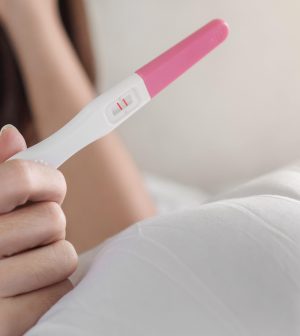- Could Your Grocery Store Meat Be Causing Recurring UTIs?
- Are You Making This Expensive Thermostat Error This Winter?
- Recognizing the Signs of Hypothyroidism
- 10 Strategies to Overcome Insomnia
- Could Artificial Sweeteners Be Aging the Brain Faster?
- Techniques for Soothing Your Nervous System
- Does the Water in Your House Smell Funny? Here’s Why
- Can a Daily Dose of Apple Cider Vinegar Actually Aid Weight Loss?
- 6 Health Beverages That Can Actually Spike Your Blood Sugar
- Treatment Options for Social Anxiety Disorder
Free Fertility App Shared Info With Third Parties, FTC Says

Owners of the free fertility app Premom have settled with users after sharing health data without consent to other companies, including Google and marketing firms in China.
The U.S. Federal Trade Commission (FTC) announced the $200,000 settlement with Premom owner Easy Healthcare.
“Premom broke its promises and compromised consumers’ privacy,” said Samuel Levine, director of the FTC’s Bureau of Consumer Protection.
“We will vigorously enforce the Health Breach Notification Rule to defend consumer’s health data from exploitation,” he said in an FTC news release. “Companies collecting this information should be aware that the FTC will not tolerate health privacy abuses.”
As part of a proposed settlement, the company agreed to a $100,000 civil penalty and another $100,000 to be paid to Connecticut, Oregon and the District of Columbia, for violating their laws.
Hundreds of thousands of users use the free app to track ovulation, menstrual periods and other health information. The app encourages users to provide information about their cycles, fertility and pregnancy and to import data from other apps such as Apple Health, the FTC said.
It said the company shared data for advertising purposes without disclosing this to users, getting their permission or limiting how that information could be used.
“The data it shared with third parties revealed highly sensitive and private details about Premom’s users and led to the unauthorized disclosure of facts about an individual user’s sexual and reproductive health, parental and pregnancy status, as well as other information about physical health conditions and status,” the FTC said.
The U.S. Department of Justice filed a proposed court order Wednesday on behalf of the FTC.
As part of that order, Easy Healthcare would be barred from sharing users’ personal health data with third parties for advertising. It would also be required to obtain users’ consent before sharing health data for any other purpose and must tell consumers how their personal data will be used, the FTC said. The proposed order must be approved by the federal court to go into effect.
Sharing of private fertility information has become more of a concern since the U.S. Supreme Court overturned Roe v. Wade.
Easy Healthcare did not admit wrongdoing, CBS News reported.
“Rather, it is a settlement to avoid the time and expense of litigation and enables us to put this matter behind us and focus on you, our users,” the company wrote in a statement on the Premom website. “Rest assured that we do not, and will not, ever sell any information about users’ health to third parties, nor do we share it for advertising purposes.”
While the Health Insurance Portability and Accountability Act, better known as HIPAA, protects medical privacy in health care settings, that doesn’t carry over to information individuals provide to tech companies, CBS News reported.
More information
The U.S. Centers for Disease Control and Prevention has more on HIPAA and privacy.
SOURCES: CBS News; FTC, news release, May 17, 2023
Source: HealthDay
Copyright © 2026 HealthDay. All rights reserved.










